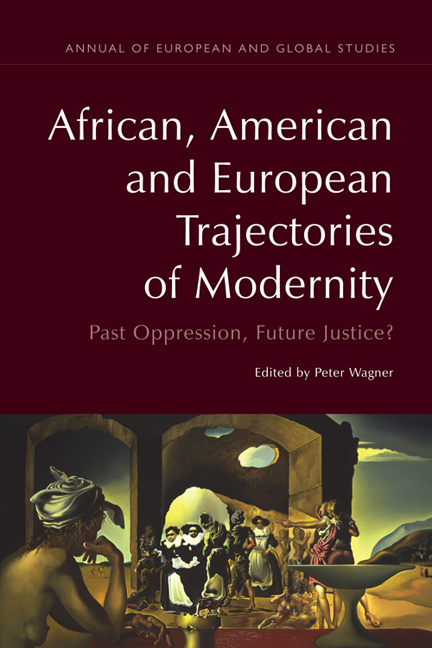Book contents
- Frontmatter
- Contents
- List of Figures
- Introduction
- Part I Reconstructing the History of Atlantic Modernity
- Part II Comparing Trajectories of Modernity in the South
- 6 Inconsistencies between Social-democratic Discourses and Neo-liberal Institutional Development in Chile and South Africa: a Comparative Analysis of the Post-authoritarian Periods
- 7 7. HIV/AIDS Policies and Modernity in Brazil and South Africa: a Comparative Critical Analysis
- 8 Land and Restitution in Comparative Perspective: Analysing the Evidence of Right to Land for Black Rural Communities in Brazil and South Africa
- Part III Claims for Justice in the History of Modernity and in its Present
- Notes on the Contributors
- Index
7 - 7. HIV/AIDS Policies and Modernity in Brazil and South Africa: a Comparative Critical Analysis
from Part II - Comparing Trajectories of Modernity in the South
Published online by Cambridge University Press: 05 August 2016
- Frontmatter
- Contents
- List of Figures
- Introduction
- Part I Reconstructing the History of Atlantic Modernity
- Part II Comparing Trajectories of Modernity in the South
- 6 Inconsistencies between Social-democratic Discourses and Neo-liberal Institutional Development in Chile and South Africa: a Comparative Analysis of the Post-authoritarian Periods
- 7 7. HIV/AIDS Policies and Modernity in Brazil and South Africa: a Comparative Critical Analysis
- 8 Land and Restitution in Comparative Perspective: Analysing the Evidence of Right to Land for Black Rural Communities in Brazil and South Africa
- Part III Claims for Justice in the History of Modernity and in its Present
- Notes on the Contributors
- Index
Summary
Introduction
THIS CHAPTER ANALYSES in a comparative fashion HIV/AIDS policies in Brazil and South Africa over the thirty-year history of the epidemic, with special attention given to the period between the mid- 1980s and the early 2000s. The emphasis is placed on the largely divergent responses of the two states to the HIV/AIDS pandemic. The core argument is that, during this period, Brazil acted far more aggressively than South Africa against the HIV/AIDS epidemic by implementing comprehensive prevention, treatment and care policies (Gauri and Lieberman, 2006). Consequently, Brazil has managed to contain the spread of the virus across its population while, in South Africa, belated effective policies have considerably contributed to today's severe HIV/AIDS epidemic.
HIV/AIDS is a pressing problem in many countries today and has gained space in social research worldwide. About 35 million of the world population are HIV-infected and two-thirds of these are found in African countries, the sub-Saharan area being the most affected. Brazil is considered a world model as regards integrated HIV/AIDS policies in terms of prevention, treatment and care which have maintained the prevalence rate stable at less than 1 per cent (UNAIDS, 2012a). Conversely, South Africa delayed tremendously in the adoption of effective measures against the epidemic and, as a result, has one of the world's highest prevalence rates of HIV, at 17 per cent (UNAIDS, 2012b). Moreover, while in Brazil the epidemic is largely concentrated in the populations of commercial sex workers and men who have sex with men (MSM), in South Africa the rate of infection of women is higher than that of men. These divergences constitute the prime reason for comparing Brazil and South Africa. Importantly, at the time of the first HIV outbreak, the two countries had similar features in terms of general state capacity, Human Development Index and civil society involvement. But the history of HIV infection would be radically different in the two countries, largely because of divergences in the timing and quality of HIV/AIDS policies, where Brazil was far superior to South Africa until roughly a decade ago.
- Type
- Chapter
- Information
- African, American and European Trajectories of ModernityPast Oppression, Future Justice?, pp. 149 - 173Publisher: Edinburgh University PressPrint publication year: 2015



